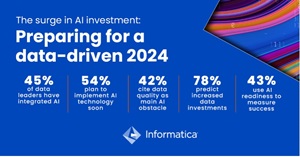News
Data Quality Hinders Enterprise Generative AI Adoption, Report Says
Data quality is the No. 1 obstacle to enterprise adoption of generative AI according to a new survey from cloud data management specialist Informatica.
Like many other survey-based reports, the new CDO Insights 2024: Charting a Course to AI Readiness study indicates that while enterprises are all in on the new generation of AI sparked by the debut of ChatGPT, they continue to wrestle with data-related issues concerning quality, governance, privacy and so on.
 [Click on image for larger view.] Report Highlights (source: Informatica).
[Click on image for larger view.] Report Highlights (source: Informatica).
Some 14 months after that debut, the study said nearly half (45 percent) of data leaders reported they've already implemented generative AI, while an additional 53 percent anticipate they will do so (with 36 percent expecting that to happen within the next two years). Those data leaders include some 600 people from companies with more than $500 million in revenue from the U.S., EU and APAC regions who were polled last October in a survey commissioned by Informatica.
"But adopting generative AI has not been easy," the report said. "All who are adopting or planning to adopt generative AI (more than 99 percent) have encountered challenges, including quality of data (42 percent, led by 49 percent of those in the U.S.) and data privacy & protection (40 percent) -- familiar big picture issues data leaders face elsewhere. And AI comes with its own unique challenges as well, including AI ethics (38 percent), quantity of domain-specific data for training and fine-tuning of LLMs (38 percent), and AI governance (36 percent). Other AI challenges include regulatory compliance (33 percent), avoiding bias (32 percent), and preparing unstructured data to work with LLMs (32 percent)."
 [Click on image for larger view.] Top Generative AI Challenges (source: Informatica).
[Click on image for larger view.] Top Generative AI Challenges (source: Informatica).
Other highlights of the report as presented by Informatica include:
-
Despite challenges to generative AI implementation, the juice will be worth the squeeze
- 73 percent of data leaders use or plan to use the technology to improve time to value with faster data insights, while 66 percent want to drive more productivity through automation and augmentation
-
Data readiness is top of mind when it comes to AI and data strategy ROI
- 43 percent of data leaders reported that improving readiness of data for AI and analytics is the most common metric to measure data strategy effectiveness, a shift from our 2023 finding indicating the top metric was to improve how data is utilized in business decision making (45 percent)
-
Data fragmentation and complexity persists and is expected to worsen in 2024
- 41 percent of data leaders struggle to balance 1,000-plus data sources, a decrease from last year (55 percent), but 79 percent expect this number to increase in the year ahead
- 58 percent of data leaders say they'll need five or more data management tools to support their priorities and manage their data estates, an increase from 2023 (50 percent)
- 39 percent of data leaders reported the increasing number of data consumers is the top technical obstacle to realize their data strategy, while 38 percent said it was the increasing volume and variety of data. Last year, the main obstacle was a lack of a complete view and understanding of their data estates (the fourth-highest obstacle in 2024)
-
Internal organizational resistance also threatens to derail data strategies and priorities
- 98 percent of data leaders admitted organizational obstacles hold back their data strategies, including a lack of leadership support (45 percent), inability to justify ROI for budget (45 percent), and lack of cooperation/alignment across business units (44 percent)
-
Investment in generative AI is driving mutual investment in data management
- Data leaders cited the ability to deliver reliable and consistent data fit for generative AI (39 percent) and improving data-driven culture and data literacy (39 percent) as the top data strategy priorities in 2024, a shift from the 2023 report where the ability to improve governance over data and data processes was the top data strategy priority (the third-highest priority in 2024) while the ability to deliver data fit for analytics and AI was the seventh-highest
- Data privacy and protection (45 percent), data quality and observability (41 percent), and data integration and engineering (37 percent) remain top data management capabilities to invest in to support these priorities
"With AI and data management both high priorities for data leaders' 2024 strategies and beyond, it's crucial these two go hand in hand: realizing value from AI means nothing without data management, and AI can be a powerful way to achieve data management goals," said the report's conclusion. "As data leaders consider both roadblocks as well as the tech- and data-related challenges, investments in data management can operate in tandem with AI to achieve their data management goals."
Data-related concerns are becoming more prominent in enterprise AI implementations as organizations realize that specialized AI constructs modeled after the LLM that powers ChatGPT are most useful when trained on their own data. That training requires clean, quality data, vaulting data governance into a top-most concern. On the Microsoft side of things, Virtualization & Cloud Review writer Paul Schnackenburg penned a detailed look at what needs to be done to prepare for widespread AI rollouts (see the article, "Microsoft Data Governance: Preparing for the Copilots").
The article explains what you need to do to prepare your business for all of Microsoft's different Copilots, "Because if you don't have good data governance, you'll likely have some 'interesting times' ahead if you roll out Copilot broadly."
About the Author
David Ramel is an editor and writer at Converge 360.